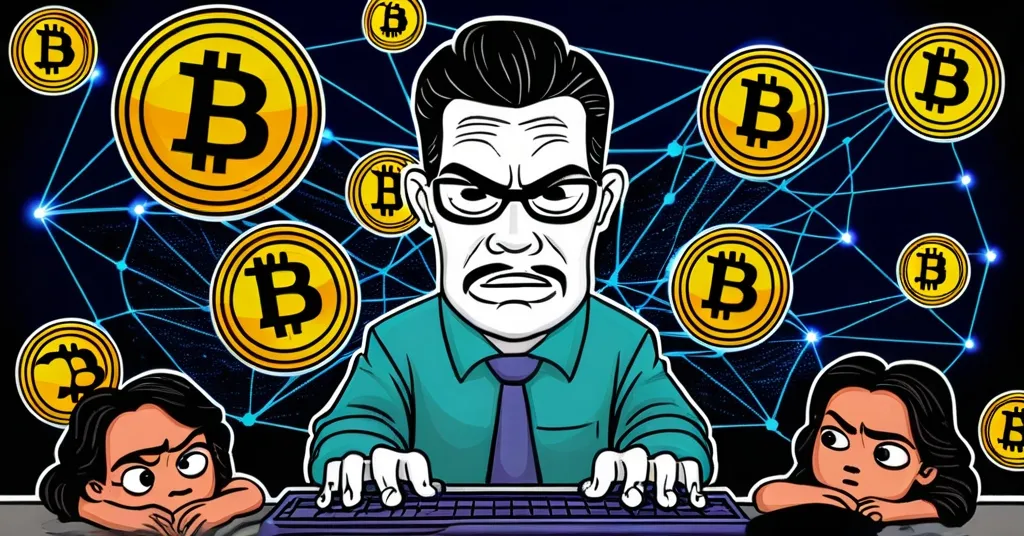Cambodia Crypto Scam Kingpin Arrested in India: Unveiling a Global Cybercrime Network

Cambodia Crypto Fraud Mastermind Traced to Uttar Pradesh: A Global Web of Cybercrime
In a significant breakthrough, Indian authorities arrested Devendra Pratap Mourya, a central figure in a vast cybercrime network operating from Cambodia. This operation has shed light on the sinister side of cryptocurrencies, which, while providing privacy and freedom, are also exploited by criminals for laundering money and other illegal activities. Mourya’s gang, comprising over 40 members, was linked to more than 500 cybercrime cases, utilizing digital currencies to hide their tracks.
- Devendra Pratap Mourya arrested in India for running a Cambodia-based cybercrime syndicate.
- Over 500 cybercrime cases linked to Mourya and his 40-member gang.
- Syndicate used cryptocurrencies to launder money, involved in human trafficking and cyber slavery.
- Thousands of Indian victims affected, lured by fake IT job promises.
- Investigation triggered by a significant fraud report, leading to a broader crackdown.
On December 29, 2024, Rourkela police apprehended Mourya, originally from Uttar Pradesh. The arrest came after a senior central government official reported a fraud amounting to Rs 67.7 lakh, which led to uncovering the syndicate’s use of a fake trading app, Indira Securities. This app, which falsely claimed to be a legal entity of the Securities and Exchange Board of India (SEBI), was a key tool in their deception. The use of cryptocurrencies for laundering money, often likened to moving money around the world without banks knowing where it came from or where it’s going, was central to their operations.
Mourya’s network was not just about financial fraud; it was part of a larger operation in Cambodia and Southeast Asia that engaged in human trafficking and cyber slavery. Cyber slavery refers to the forced labor of individuals in online scam operations. The syndicate lured victims with promises of lucrative IT jobs, only to exploit them in a cycle of fraud. They used pre-activated SIM cards, mule bank accounts (accounts used to receive and transfer money for criminals), and local agents to carry out their schemes, demonstrating the sophistication and planning behind these crimes.
Thousands of Indian victims found themselves trapped abroad, unable to return home due to passport restrictions and financial extortion by the syndicate. This grim situation underscores the need for more robust support mechanisms, including legal assistance and safe repatriation, to help those affected. These scams have a human cost that goes beyond financial losses, trapping individuals in a web of exploitation.
While cryptocurrencies like Bitcoin hold immense potential for financial freedom and decentralization, this case highlights the challenges they pose for law enforcement due to their anonymity and borderless nature. It’s a stark reminder that as we push towards a decentralized future, we must also address the vulnerabilities that can be exploited by criminal elements. It seems the only thing faster than Bitcoin transactions these days are the criminals using them.
The arrest of Mourya and the exposure of his syndicate are steps forward, but they also emphasize the need for international cooperation to tackle these transnational crimes effectively. As we champion the ideals of decentralization and privacy, we must also advocate for stronger regulations and increased public awareness to safeguard the integrity of the cryptocurrency ecosystem. Cambodia has become a hub for such operations, often involving Chinese nationals, and addressing this requires a concerted global effort.
The broader implications of these crimes on the crypto industry cannot be ignored. They highlight the need for a balanced approach that embraces the potential of cryptocurrencies while addressing the risks. Better regulatory frameworks and vigilance are essential to prevent the misuse of digital currencies in criminal activities. Additionally, raising public awareness about the risks of fake job offers and investment scams, particularly those involving cryptocurrencies, is crucial.
The cryptocurrency community can play a vital role in preventing such crimes. Advocating for better education on the risks of cryptocurrencies, supporting transparent and regulated platforms, and reporting suspicious activities to authorities are steps that can help. Individuals should be wary of unsolicited job offers, especially those promising high returns or requiring payment in cryptocurrency. Always verify the legitimacy of apps and companies before investing. For more insights on preventing cryptocurrency fraud, check out Quora’s discussions.
Key Takeaways and Questions
- What was the nature of the cybercrime syndicate led by Devendra Pratap Mourya?
The syndicate engaged in cryptocurrency scams, human trafficking, and cyber slavery, operating from Cambodia and targeting victims globally.
- How were Indian victims affected by the syndicate’s activities?
Over 1,000 Indian victims faced difficulties returning home due to passport restrictions and financial extortion by the syndicate.
- What methods did the syndicate use to lure and exploit victims?
The syndicate used pre-activated SIM cards, mule bank accounts, and local agents to attract Indian youth with fake IT job promises, exploiting them for cybercrime activities.
- What triggered the investigation into the syndicate?
The investigation was initiated after a senior central government official reported a fraud of Rs 67.7 lakh.
- What role did the fake trading app Indira Securities play in the scam?
The app, falsely claiming to be a legal entity of the SEBI, was used to deceive victims and facilitate the fraud.
- What broader criminal activities were associated with the syndicate?
The syndicate was part of a larger operation in Cambodia and Southeast Asia involved in cryptocurrency scams, human trafficking, and cyber slavery.
- What can individuals do to protect themselves from similar cryptocurrency scams?
Individuals should be wary of unsolicited job offers, especially those promising high returns or requiring payment in cryptocurrency. Always verify the legitimacy of apps and companies before investing.
- How can the cryptocurrency community help prevent such crimes?
The community should advocate for better education on the risks of cryptocurrencies, support transparent and regulated platforms, and report suspicious activities to authorities.



